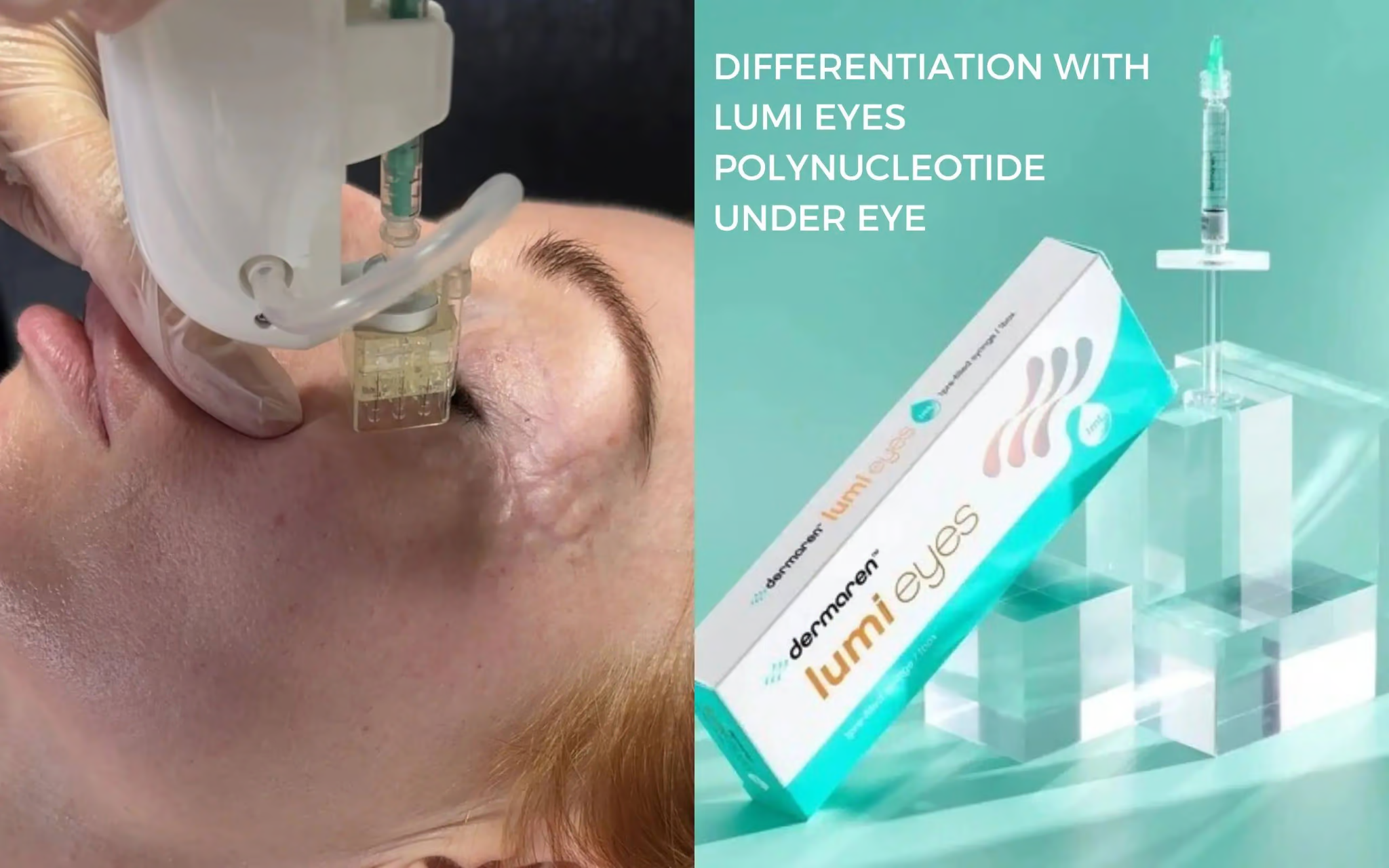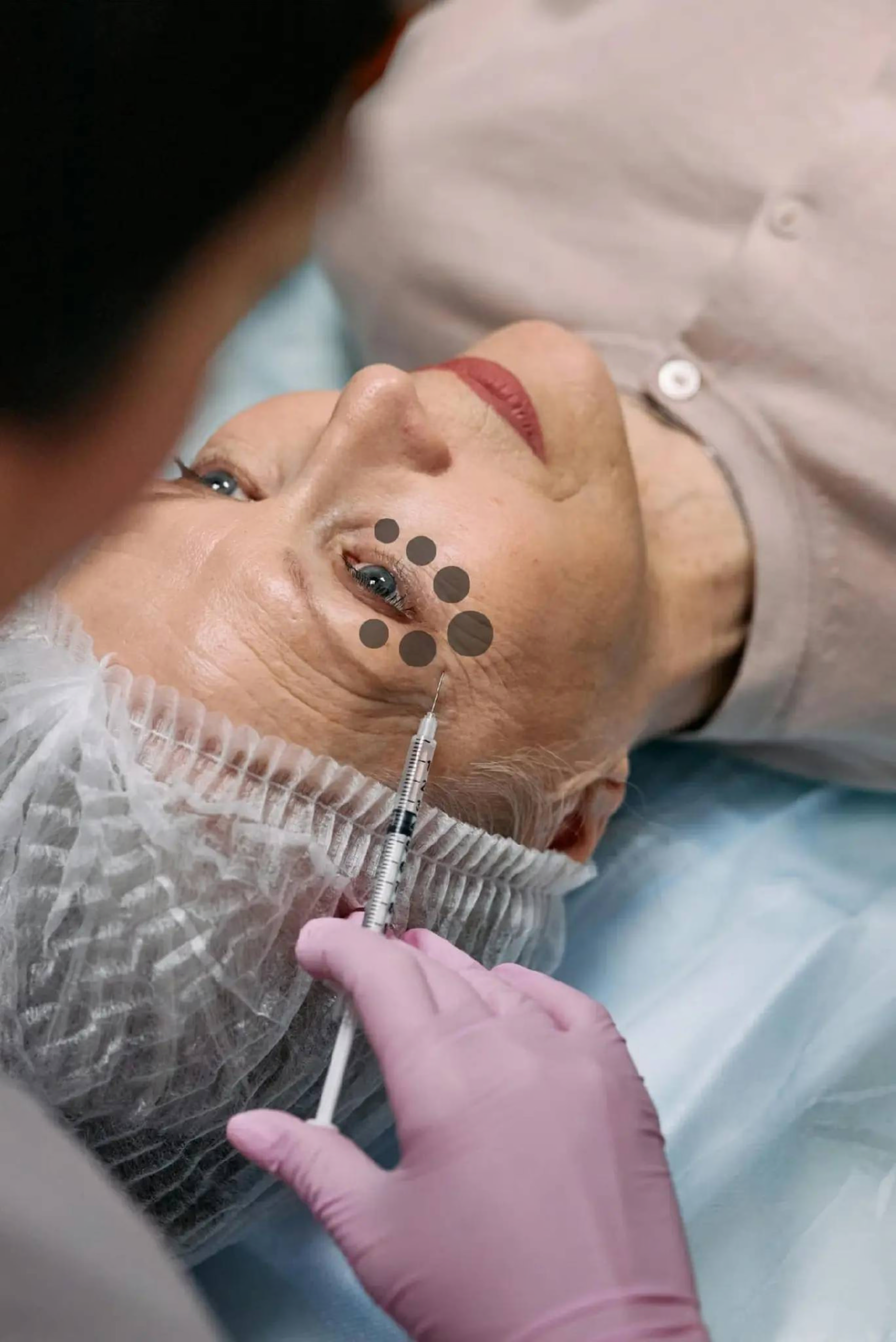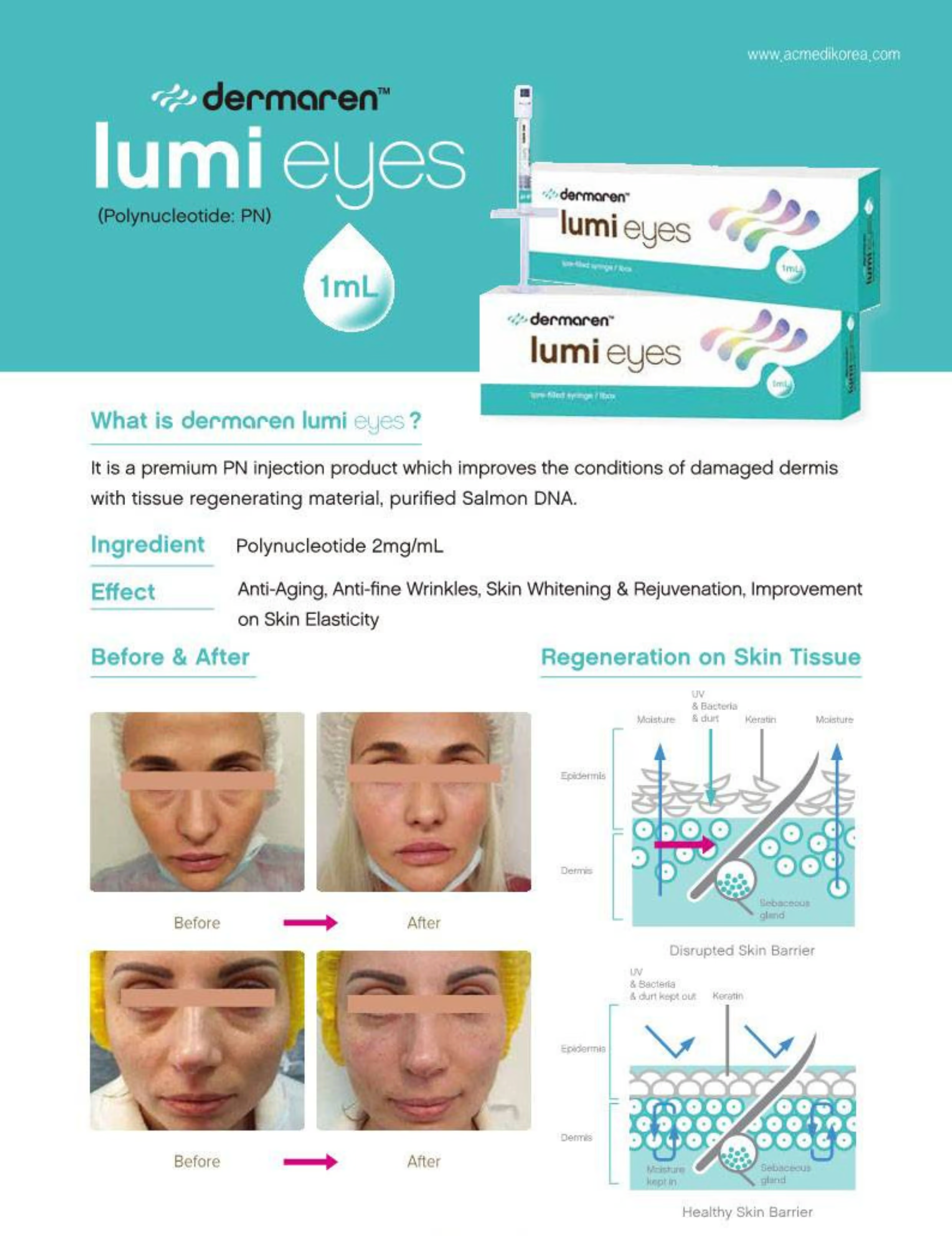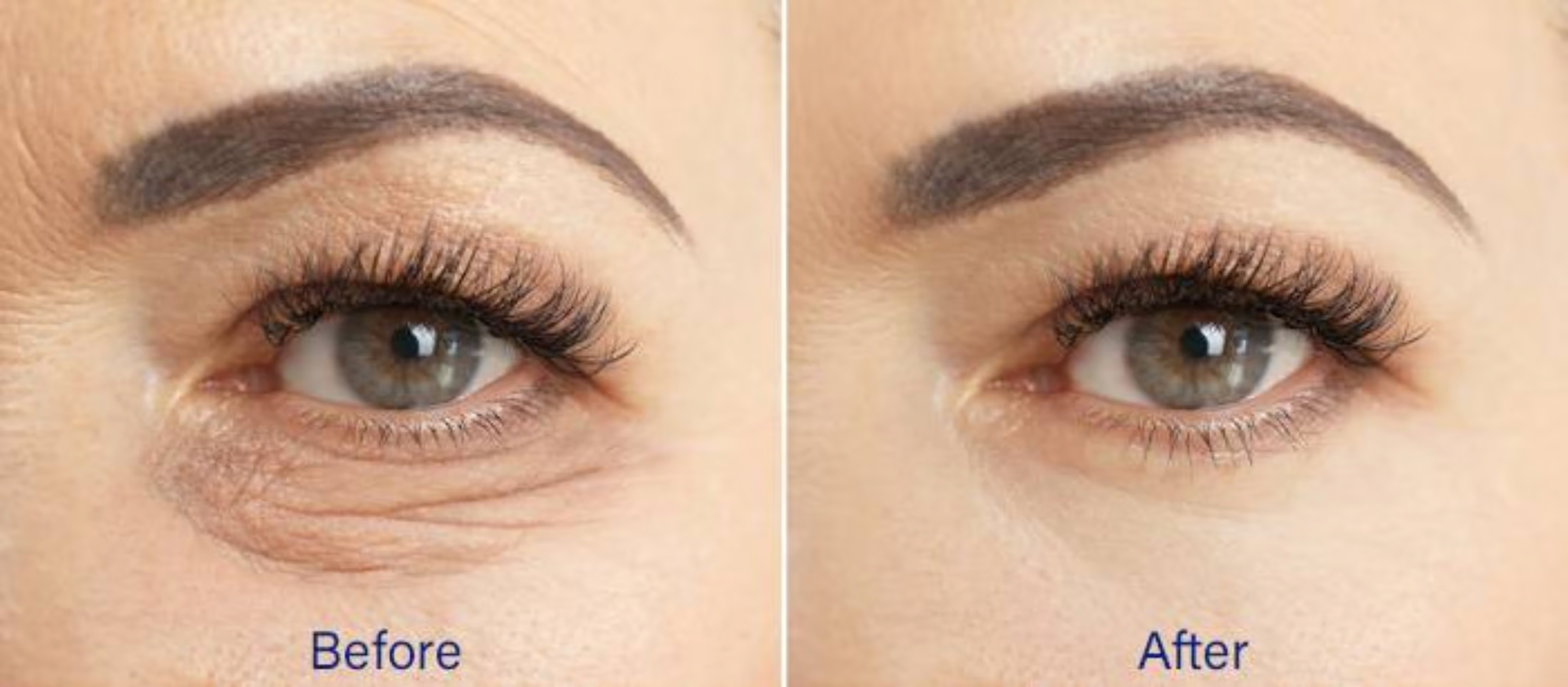

At Paradise Wellness, the leading hair and skin clinic in Delhi, we are dedicated to offering the most advanced and effective skincare solutions. Among our premier services is Lumi Eyes, an innovative polynucleotide-based treatment designed to revitalize the delicate skin around your eyes. Whether you're seeking to reduce dark circles, smooth fine lines, or achieve a more youthful, refreshed look, our expert team in Vasant Vihar, Pitampura, and Civil Lines is here to help you experience the best Lumi Eyes treatment in Delhi.
Lumi Eyes is a polynucleotide-based tissue stimulator primarily designed for mesotherapy treatments in the delicate periocular area, encompassing the skin around the eyes and the tear valley. It functions as a sophisticated skin booster rather than a traditional dermal filler, with its core purpose being to regenerate and rejuvenate skin tissue at a cellular level. The fundamental mechanism involves stimulating the skin's inherent regenerative processes to enhance hydration, elasticity, and overall skin quality.
This action aims to mitigate common signs of aging and fatigue, such as dark circles, fine lines, and a dull complexion in the under-eye region. The treatment is promoted for its capacity to deliver substantial hydration and tissue rejuvenation, effectively reducing indicators of fatigue and skin discoloration. It also contributes to significant improvements in skin elasticity, firmness, and density. A notable advantage frequently cited is the minimal to zero downtime associated with the procedure, allowing individuals to resume their daily activities swiftly.
Within the rapidly expanding market for minimally invasive aesthetic solutions, Lumi Eyes is often positioned as an "economical alternative". While it has achieved widespread availability, a critical examination of the available information reveals a distinction between the general scientific support for polynucleotide efficacy and the specific, robust clinical trials for Lumi Eyes' unique formulation. Some sources indicate that product-specific scientific evidence may be limited or largely anecdotal. This aspect, coupled with its comparatively lower polynucleotide concentration, suggests that multiple treatment sessions are often required to achieve optimal and lasting results.

Lumi Eyes – Under-Eye Rejuvenation
Lumi Eyes is precisely defined as a tissue stimulator engineered for needle mesotherapy applications, specifically targeting the intricate periocular region. This includes the delicate skin immediately around the eyes and within the tear trough area. It is characterized as a high-quality product that actively repairs damage to the dermis through the application of polynucleotides, which are renowned for their potent tissue-regenerating capabilities.
A fundamental aspect of understanding Lumi Eyes is its classification: it is explicitly stated to be "NOT a filler". This differentiation is critical because, unlike traditional dermal fillers—which primarily function by adding volume to specific areas to plump the skin or fill wrinkles—Lumi Eyes operates as a "skin booster" or "injectable skincare". Its objective is to stimulate the skin's natural regenerative processes, rather than providing a physical filling effect through inert substances. The product's marketing often highlights its ability to achieve a "filling effect", yet simultaneously emphasizes that it is not a filler. This nuanced language suggests a strategic approach to convey that while visible improvements in contour and smoothness are anticipated, these are achieved through biological regeneration and hydration rather than volumetric augmentation.
This approach also allows the product to differentiate itself by assuring "no side effects in the form of lymphoedema", a known potential complication associated with some hyaluronic acid (HA) fillers when used in the tear trough area. By focusing on regeneration, Lumi Eyes aims to appeal to individuals seeking natural-looking results without the specific risks tied to volumetric fillers.
The skin surrounding the eyes is exceptionally delicate and thin, rendering it particularly susceptible to visible signs of aging and fatigue. Factors such as genetics, lifestyle choices, environmental exposure, and even sleep patterns can significantly impact the appearance of this area. Lumi Eyes is specifically formulated to address a comprehensive range of common periocular concerns. These include the reduction of dark circles and puffiness, the smoothing of fine lines and wrinkles, and the improvement of under-eye bags, sagging eyelids, and uneven skin tone. It also targets dry, crepey skin around the eyes, aiming to restore a more youthful and refreshed appearance.

Key Ingredients – Polynucleotides (PDRN)
The primary active component in Lumi Eyes is Polynucleotide (PN), specifically identified as Polydeoxyribonucleotide (PDRN). This ingredient is typically present at a concentration of 2mg/ml or 5mg/ml. These polynucleotides are biopolymers derived from purified salmon milk DNA. The selection of salmon DNA is attributed to its rich biological materials, which are highly biocompatible and proven safe for cosmetic applications.
PDRN functions as a potent tissue stimulator, operating at a cellular level to repair damaged skin and promote its regeneration. Its mechanism of action encompasses several crucial biological processes:
Polynucleotides are also involved in angiogenesis, the formation of new blood vessels, mediated by an increased production of vascular endothelial growth factor (VEGF). Enhanced angiogenesis improves tissue perfusion and nutrient supply, which is particularly beneficial for aging or hyperpigmented skin areas where blood flow may be compromised.
Anti-inflammatory and Antioxidant Properties: PDRN exhibits anti-inflammatory properties and contributes to the rebalancing of melanocyte activity, thereby helping to address pigmentation irregularities.
The distinction between PDRN (Polydeoxyribonucleotide) and PN (Polynucleotide) is relevant in scientific discourse. PDRN typically refers to low molecular weight polynucleotides (less than 1500 kDa), while PN can denote longer-chain polymers (1500 kDa or greater). Lumi Eyes is consistently described as containing PDRN. Understanding the molecular weight of the polynucleotides used in Lumi Eyes (PDRN) offers a deeper scientific perspective. Lower molecular weight PDRN may possess distinct pharmacokinetic properties, such as faster dispersion or different cellular signaling pathways, compared to higher molecular weight PNs. This qualitative difference in the active ingredient can contribute to the observed "lower polynucleotide concentration" in Lumi Eyes when compared to some other brands, and consequently, the potential necessity for multiple treatment sessions to achieve a comparable cumulative biological effect.In addition to polynucleotides, Glutathione is incorporated into the Lumi Eyes formula. Glutathione provides significant antioxidant effects during the biorevitalisation procedure, further enhancing overall skin quality. While one source mentions Hyaluronic Acid (HA), Amino Acids, and Peptides as ingredients, the predominant and consistent information across most other sources emphasizes PDRN and Glutathione as the core active components of Lumi Eyes. This discrepancy could indicate variations in product formulations, or it might represent a broader description of polynucleotide-based boosters that may contain such additional compounds, rather than a definitive statement about the specific Lumi Eyes product. For the purpose of this review, the focus remains on the most consistently cited primary active ingredients, PDRN and Glutathione, which are central to the product's advertised mechanisms.
Lumi Eyes is meticulously formulated to address a spectrum of common aesthetic concerns prevalent in the delicate periocular region. The regenerative action of its polynucleotide components translates into several key benefits for the skin.
The treatment specifically targets:
The regenerative action of polynucleotides inherent in Lumi Eyes yields several profound benefits:
The consistent emphasis on "repair damage to the dermis", "restoring skin cell structure", and "stimulating skin to self-regenerate" indicates that Lumi Eyes aims for a deeper, biological improvement in skin health rather than merely masking superficial symptoms. This approach positions the treatment as a long-term investment in skin vitality, appealing to individuals seeking sustainable improvements in skin quality rather than just immediate cosmetic fixes.
| Aesthetic Concerns Addressed | Key Benefits Observed |
|---|---|
| Dark Circles | Deep Hydration |
| Fine Lines & Wrinkles | Tissue Rejuvenation & Regeneration |
| Puffiness/Under-eye Bags | Reduced Fatigue Symptoms/Skin Blueing |
| Sagging Eyelids/Skin Laxity | Improved Skin Elasticity & Firmness |
| Tired/Dull Skin | Stimulation of Collagen & Elastin |
| Uneven Skin Tone/Pigmentation | Brighter Under-Eye Area |
| Dry/Crepey Skin | Anti-aging Effects |
| Restoration of Skin Barrier |
The administration of Lumi Eyes follows a specific protocol designed to maximize its regenerative effects in the delicate periocular area.
Lumi Eyes is administered through needle mesotherapy, which involves a series of small micro-injections precisely placed at targeted points around the eye area and within the tear valley. While micro-injections are the primary method, some sources also indicate the potential for using a cannula for administration. The recommended needle size for these injections is typically 32G x 4mm, and common insertion techniques include serial puncture and linear administration. Prior to the procedure, the skin is cleansed, and a topical anesthetic may be applied to minimize discomfort, though it is often not deemed necessary.
While some marketing claims suggest a "perfect effect after just one treatment", for achieving optimal and more enduring results, a series of treatments is consistently recommended. This typically involves 2-3 sessions, with many sources recommending a course of 3 treatments. These initial sessions are usually spaced 4 weeks apart, though some variations exist, with intervals of 2-4 weeks or 20-30 days also mentioned. One source suggests 3 weeks apart. The slight inconsistencies in recommended treatment intervals and maintenance frequency across different sources suggest that a single, universally standardized protocol may not yet be firmly established or widely adopted. This situation implies that the optimal protocol might still be evolving, or that different practitioners and suppliers are interpreting general polynucleotide guidelines rather than relying on specific, dedicated clinical efficacy studies for the Lumi Eyes formulation. Consequently, it is important for both practitioners and patients to engage in a detailed discussion to establish an individualized treatment plan that considers the practitioner's experience and the patient's unique response to the treatment.
To sustain the rejuvenating effects achieved from the initial course, maintenance treatments are recommended. These are typically advised twice a year or every 6 months, with one source suggesting annual maintenance.
A significant advantage highlighted for Lumi Eyes is its minimal to "zero downtime" or "no downtime". This means that individuals can generally return to their normal daily activities immediately following the procedure. However, it is important to clarify that while functional downtime is minimal, immediate aesthetic normalcy should not be expected. The acknowledgment of immediate post-treatment effects such as "slight swelling and bruising" and "raised red swollen bumps" indicates that while one can resume activities, the aesthetic appearance may not be instantly flawless. This distinction is vital for managing patient expectations and preventing disappointment.
While some subtle improvements, such as an instant brightening and plumping effect, may be noticed immediately after the first session, the full effects of the treatment typically become apparent within 2 to 4 weeks. The benefits are cumulative and can last for several months, with one source citing a duration of 6-12 months.
To minimize potential risks and optimize outcomes, specific pre- and post-treatment care guidelines are advised.
| Aspect | Details |
|---|---|
| Application Method | Needle Mesotherapy (Micro-injections), Potential Cannula Use, Recommended Needle Size: 32G x 4mm, Common Techniques: Serial Puncture, Linear Administration |
| Initial Treatment Course | Number of Sessions: 2-3 sessions, typically 3, Interval Between Sessions: 3-4 weeks (most common), also 2-4 weeks or 20-30 days |
| Maintenance Frequency | Twice a year / Every 6 months, or Annually |
| Functional Downtime | Minimal / Zero |
| Visible Post-Treatment Effects | Temporary swelling, bruising, redness, small injection marks, Raised Bumps (like ant bites) (resolving within 24-48 hours) |
| Onset of Results | Instant brightening/plumping after first session, full effects within 2-4 weeks |
| Duration of Effects | Several months, typically 6-12 months |
While Lumi Eyes is generally considered safe when administered by a qualified and experienced practitioner, it is important for prospective patients to be aware of the potential side effects and contraindications associated with the treatment.
Patients may experience mild and temporary side effects following the procedure. These commonly include slight swelling and bruising, which typically resolve within 24 hours to a few days. Other reported effects are redness and irritation at the injection sites, as well as small injection marks. It is also common for patients to develop raised red swollen bumps at the injection site that resemble ant bites; these are usually transient and settle within 24-48 hours. More broadly, polynucleotide injections can lead to erythema (redness), pruritus (itching), edema (swelling), ecchymoses (bruising), transient irritation, and infraorbital lumps.
While uncommon, allergic reactions are a possible adverse event, particularly if the patient has a known allergy to any of the preparation's ingredients. Given that the polynucleotides are derived from purified salmon milk DNA, individuals with known hypersensitivity to fish proteins should exercise caution or avoid the treatment entirely.
A thorough medical consultation is indispensable prior to any treatment to identify and assess any contraindications that would preclude the safe administration of Lumi Eyes. The detailed nature of these contraindications underscores that despite being a minimally invasive aesthetic procedure, Lumi Eyes is a medical treatment requiring rigorous patient screening. The specific mention of systemic conditions and medications indicates the potential for broader physiological interactions or increased risks in certain patient populations. This reinforces the necessity for the procedure to be performed by a highly qualified and experienced medical professional who can accurately assess these risks and ensure patient safety.
Key contraindications include:
It is important to note that while the general class of polynucleotides is considered safe, the findings of "no adverse events" in some studies refer to an "under-eye serum" or general polynucleotide use, and are not explicitly identified as studies conducted specifically on Lumi Eyes. This highlights an ongoing challenge in directly attributing broad scientific evidence to a specific commercial product, especially given the stated "lack of scientific evidence" for Lumi Eyes' unique formulation. Therefore, while the ingredients are generally safe, product-specific safety data might be less robust, necessitating reliance on general polynucleotide safety guidelines and the practitioner's clinical judgment and experience.
| Category | Details |
|---|---|
| Common, Temporary Side Effects | Swelling, Bruising, Redness, Irritation, Small Injection Marks, Raised Bumps (like ant bites), Erythema, Pruritus (itching), Edema, Ecchymoses, Transient Irritation, Infraorbital Lumps |
| Rare but Possible Adverse Events | Allergic Reactions (especially to fish proteins or other ingredients) |
| Key Contraindications | Cancer / Undergoing Chemotherapy, Pregnancy / Lactation, HIV/AIDS, Active Skin Infections (e.g., herpes), Certain Skin Conditions (Rosacea, Solar Keratosis, Acne Vulgaris Stage III-IV), Use of Anticoagulants / Blood Thinners (e.g., Warfarin, aspirin, NSAIDs, Vitamin E, Fish Oils), Diabetes, Autoimmune Diseases, Roaccutane use, Tendency to Keloid Scarring, Blood Clotting Problems, Known Allergy to Ingredients |
The scientific understanding of polynucleotides as a class of regenerative agents is continuously advancing, but it is crucial to differentiate this general evidence from product-specific clinical data for Lumi Eyes.
Polynucleotides have emerged as a significant advancement in aesthetic medicine, offering a natural and effective solution for skin rejuvenation. Clinical trials have demonstrated their efficacy in improving various skin parameters, including hydration, elasticity, firmness, texture, and tone. Specifically for the delicate periorbital area, research indicates that polynucleotide injections can effectively reduce fine lines, improve overall skin quality (including addressing crepiness and laxity), stimulate fibroblast proliferation, enhance collagen production, and promote angiogenesis. Some studies even suggest that polynucleotide fillers may outperform hyaluronic acid fillers in improving skin elasticity and wrinkle reduction around the eyes. A systematic review of nine studies on polynucleotide use found promising results for skin rejuvenation and tissue repair, along with a favorable safety profile. However, this review also highlighted the "low and moderate quality of existing studies" and underscored the necessity for "further, high-quality research" to draw more definitive conclusions.
Despite the growing general evidence for polynucleotides, a critical aspect of Lumi Eyes is the stated "lack of scientific evidence" specifically for its efficiency, with some sources noting that most available support is anecdotal. While one source claims that "clinical studies and real-life testimonials have demonstrated Lumi Eyes' efficacy", it does not provide specific citations to peer-reviewed trials directly on the Lumi Eyes product. Furthermore, a study on an "under-eye serum" showed significant improvements in periorbital hyperpigmentation (e.g., a mean percentage improvement of 49.47% in global photographs and a 12.29% reduction in melanin at 3 months) and high patient satisfaction (94.12% rated "excellent," "very good," or "good"). However, this study is not explicitly identified as pertaining to Lumi Eyes, and it describes a topical serum rather than the injectable product, which limits its direct applicability to the specific injectable treatment under review. This absence of robust, product-specific clinical trials means that while the general mechanism of polynucleotides is plausible, the specific efficacy and safety of Lumi Eyes' unique formulation may not be as rigorously validated as some of its competitors. This represents a significant gap in the evidence base that practitioners and patients should consider.
Lumi Eyes contains a polynucleotide concentration of approximately 2mg/ml or 5mg/ml, which is broadly described as "roughly 2%". This concentration is notably lower than that found in some other leading polynucleotide brands, such as Dr Bong's Polynucleotide EyeBright, which boasts a 20% concentration. This lower concentration is frequently cited as a direct reason for the necessity of multiple treatment sessions to observe noticeable changes. If the active ingredient is less concentrated, it logically follows that more applications would be required to achieve a comparable cumulative biological effect. This implication challenges the marketing claim of a "perfect effect after just one treatment", suggesting that while an initial visible improvement might occur, the optimal and lasting regenerative benefits necessitate a full course of treatment. This has implications for the overall cost-effectiveness and time commitment for the patient, despite a potentially lower per-session price. Furthermore, the manual injection technique typically employed for Lumi Eyes treatments may sometimes penetrate too deeply, depositing the polynucleotide lower than the dermis in the fatty tissue. Although some benefits may still be observed as the product permeates upwards toward the dermis, this deeper placement could further diminish the effective concentration reaching the targeted dermal layer.
Lumi Eyes occupies a distinct niche within the broad landscape of aesthetic treatments, offering a unique approach to periorbital rejuvenation compared to traditional methods.
The most significant distinction for Lumi Eyes is its unequivocal classification as "NOT a filler". Traditional dermal fillers, predominantly composed of hyaluronic acid (HA), are designed to add volume, physically plumping the skin or filling in wrinkles and hollows. In contrast, Lumi Eyes functions by stimulating the skin's natural regenerative processes, actively repairing DNA chains and rejuvenating tissue at a cellular level. While fillers primarily reduce shadowing by adding volume to hollow areas, Lumi Eyes focuses on fundamentally improving skin quality, texture, elasticity, and overall skin health through biological regeneration. A crucial advantage highlighted for Lumi Eyes is the absence of a risk of vascular occlusion, a serious and potentially vision-threatening complication associated with some tear trough fillers. This strategic differentiation directly addresses a major safety concern associated with HA fillers, particularly in the delicate periorbital area, positioning Lumi Eyes as a safer, complementary, or alternative treatment for patients who prioritize regeneration and safety over volumetric changes. Clinical trials suggest that polynucleotide fillers, as a class, may even outperform hyaluronic acid fillers in improving skin elasticity and wrinkle reduction around the eyes. It is important to note that both Lumi Eyes and traditional fillers can be used in combination to achieve comprehensive facial rejuvenation, leveraging their distinct mechanisms for synergistic effects.
Neurotoxins, such as Botox, operate through a fundamentally different mechanism. Their primary action is to target dynamic wrinkles, which are lines formed by repetitive muscle movements, like crow's feet. By temporarily relaxing these muscles, neurotoxins smooth out expression lines. Polynucleotides, including those in Lumi Eyes, work at a cellular level to stimulate collagen production and enhance skin quality, hydration, and texture, without impacting muscle activity. Consequently, while Botox addresses the muscular cause of certain wrinkles, Lumi Eyes improves the intrinsic health and appearance of the skin itself through regeneration. These treatments are not mutually exclusive; they are complementary and can be combined to provide a multi-faceted approach to facial rejuvenation, addressing both dynamic wrinkles and overall skin quality.
Compared to other skin rejuvenation modalities, Lumi Eyes offers specific advantages:
Within the burgeoning polynucleotide market, Lumi Eyes is often positioned as an "economical alternative". However, this affordability comes with certain distinctions when compared to other leading polynucleotide brands.
Lumi Eyes represents an innovative approach to periorbital rejuvenation, positioned as a polynucleotide-based tissue stimulator designed for mesotherapy treatments around the eyes and tear valley. It functions as a regenerative skin booster, distinct from traditional dermal fillers, primarily aiming to improve skin quality, hydration, and elasticity through cellular repair and regeneration. Its core mechanism involves stimulating the synthesis of collagen and elastin, promoting fibroblast proliferation, and enhancing tissue health, thereby addressing concerns such as dark circles, fine lines, puffiness, and a tired appearance. The treatment offers several compelling benefits, including strong hydration, tissue rejuvenation, reduction of fatigue symptoms, and improved skin firmness and density. It is characterized by minimal to zero downtime, allowing for immediate return to daily activities, though temporary post-treatment effects like swelling and bruising are common. For optimal and lasting results, a course of 2-3 sessions, typically spaced 3-4 weeks apart, is recommended, followed by maintenance treatments every 6-12 months.
A comprehensive understanding of Lumi Eyes necessitates a critical evaluation of its scientific backing. While the broader class of polynucleotides is gaining increasing scientific validation for its regenerative properties and safety, specific, robust clinical trials for Lumi Eyes' unique formulation appear limited, with some sources describing available support as largely anecdotal. This is further compounded by its comparatively lower polynucleotide concentration (approximately 2%) when contrasted with other leading brands (e.g., 20%). This lower concentration directly contributes to the necessity for multiple treatment sessions to achieve noticeable and sustained results, influencing the overall cost-effectiveness and time commitment for patients.
In the competitive aesthetic market, Lumi Eyes strategically differentiates itself from traditional hyaluronic acid fillers by emphasizing its regenerative mechanism over volumetric filling and highlighting the absence of risks such as vascular occlusion. It complements other treatments like neurotoxins, which target dynamic wrinkles, by focusing on overall skin health. For prospective patients and practitioners, an informed decision regarding Lumi Eyes requires a balanced consideration of its promising regenerative potential, its convenient treatment protocol, and the current state of its product-specific clinical evidence. It is paramount that the procedure is performed by a qualified and experienced medical professional who can conduct a thorough patient assessment, discuss realistic expectations, and ensure adherence to all safety guidelines and contraindications.
The cost of Lumi Eyes treatment in Delhi can vary based on the number of sessions required and any customized treatment plans. At Paradise Wellness, we offer personalized skincare experiences designed to meet individual needs and preferences. Please contact us for a detailed consultation and a tailored quote for your Lumi Eyes treatment journey.
At Paradise Wellness, we are committed to helping you achieve your skincare goals with the most advanced and effective treatments available. Our expert team at our clinics in Vasant Vihar, Pitampura, and Civil Lines, Delhi, is here to provide you with a luxurious and effective Lumi Eyes experience. We use state-of-the-art technology and high-quality products to ensure you receive the best care possible for a revitalized under-eye area. Trust us to deliver personalized care and help you achieve the best possible results for brighter, more youthful-looking eyes.
Book your consultation today and take the first step towards transforming your periorbital concerns with Lumi Eyes at Paradise Wellness. Your journey to radiant, healthy skin begins here!

*(Image: Before and After Lumi Eyes Treatment)*
*(Video: Understanding Polynucleotides for Eye Rejuvenation)*

